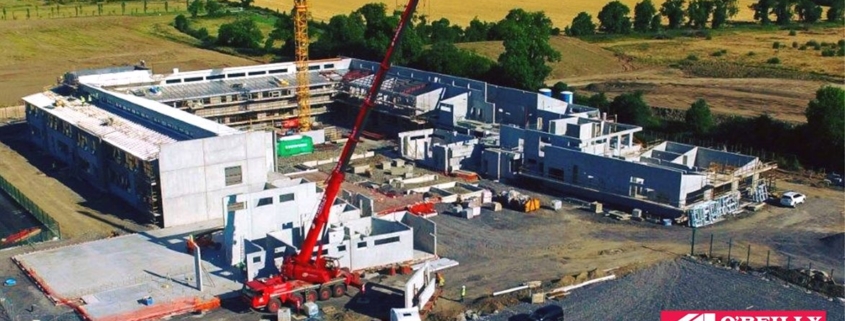An Insight: Complexities of the Role of Transportation in a Large Precast Concrete Company
Transport in large, multinational companies is an ever-evolving phenomenon. More and more products are being introduced on a daily basis, therefore, you must adapt and attempt to add them in to an already clustered schedule. In a Concrete based industry, Pods for example can be problematic with different height and weight restrictions as well as other specifications. If only it was as simple as just loading them onto a lorry and waving them off into the sunset.
One such feature is analysing the different haulage companies who are available to transport these deliveries. Since the Recession, the number of haulage companies has grown significantly and is now a fiercely competitive sector. Transport Manager in O’Reilly Concrete, Dave Barry can testify to this, “we are inundated with enquiries from different parties about potential jobs which may be arising at a particular time. In many ways this works to our advantage, however, it is crucial we do not make any hasty decisions and evaluate all the alternatives in a thorough fashion.”
O’Reilly Concrete regularly use a wide range of haulage companies across the UK and Ireland. Irish companies include Millroad Transport, Copper Haulage, Ward Transport and McVitty Transport. For the Uk deliveries, these include BM Transport, Surefreight, Nolan Transport, Roche Freight Transport and Perenial Transport.
Generally speaking, price is the number 1 factor in the decision-making process, however, there are also other factors which might not seem near as important but are actually equally if not more important. Reliability from past experiences is taken into account as well as the timescale of a project.
Dave spoke about he uses a system or a formula to choose the delivery method. “We compare and contrast three different prices to see where we can get the best value. We also take into account the quality of the service, which at times, is more important than the price.”
A simple example of why there is more to picking a haulage company than basing it purely on the cheapest option is if a certain company may be €200 cheaper than one of its competitors. The obvious instinct is to go with the cheapest available price, however, if it is 2 hours late then that €200 of a saving suddenly disappears when there is a crane and workers waiting. The job is in turn delayed and the more expensive option may have proved more fruitful in the long haul.
Transport managers like Dave encounter different problems every day. “Some are avoidable and others are completely unavoidable such as boats not sailing due to rough seas or lorries breaking down. There is a lot of things out of your hands and you need a bit of luck.” We also depend on the people who work on site because there is only so much that can be done from the comfort of the office.”
There is a long and vigorous process for Dave to follow when he first begins the journey. Firstly, he must receive the file from the design office with all the relevant customer and product information. From there, Dave rings the site and arranges a date and plans the delivery and availability of trucks and drivers plus how long it will take. This can prove time consuming if the right type of crane or other things are unavailable. The final step is to assign a fitting crew to go and fit the product whatever it may be. There are so many factors that are linked or intertwined so it is vital to have everyone singing off the same hymn sheet.
Dave uses a checklist to ensure everything is done right and in the correct order and the fact he has valuable experience in fitting helps him understand what can and can’t be done in a day and how many loads will be fitted daily or weekly. Schools can be problematic in the sense that work needs to be completed in certain time frames so there is a small window in which to operate.
90% of the haulage is external with smaller jobs carried out by O’Reilly lorries. It costs less to outsource than buy a huge fleet lorries and trucks. “There is no busy or quiet season, it varies from week to week. There is never really a dull moment especially when there are a couple of big project’s in the UK.” The prime focus is to deliver a quality product and most importantly service. “If the service is good then price comes second.”
According to Dave, “technology is everything!” An email takes 30 seconds to write and generally speaking responses are instant just like Whatsapp which is instant messaging. LinkedIn helps transport manager like Dave build up contacts. He also uses his smartphone to catch-up on emails in the evening time and even uses Snapchat to send and receive pictures of projects taking place across the UK and Ireland. Ultimately, “technology makes life easier and the days of using a pen and paper are suddenly disappearing at a rapid speed.







